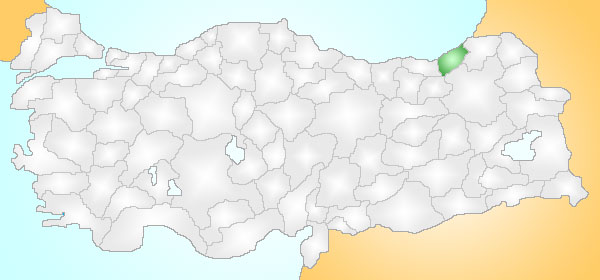- Pazar
Infobox Settlement
settlement_type = Town
subdivision_type = Country
subdivision_name = TUR
timezone=EET
utc_offset=+2
map_caption =Location of PAGENAME within Turkey.
timezone_DST=EEST
utc_offset_DST=+3official_name = Pazar
image_caption =
image_blank_emblem =
blank_emblem_type =
subdivision_type1=Region
subdivision_name1 = Black Sea
subdivision_type2=Province
subdivision_name2 = Rize| population_total =
population_as_of = 2000
population_density_km2 =
area_total_km2 = 315|elevation_m = 37|latd = 41
latm = 10
latNS = N
longd = 40
longm = 53
longEW = E
postal_code_type=Postal code
postal_code = 53
area_code = (0090)+ 464
leader_name =
blank_info = 53|blank_name=Licence plate
website =Pazar is a town and district of
Rize Province in the Black Sea region ofTurkey , 37 km east of the city ofRize .Etymology
Formerly the town had the Greek name "Atina" and was renamed Pazar, meaning "market", in 1928.
Geography
Pazar is a strip of
Black Sea coast with high mountains running parallel to the coast inland. This coast has a mild climate with warm summers (22°C in August) and cool winters (7°C in January, it rarely snows on the coast), but very wet and humid, apart from the early summer (April-May-June) it rains heavily here all year round, with an average of 50 summy days per year. The wind off theBlack Sea is cold in autumn, warm and wet in summer.With all this rainfall the area is very green, and even more water is brought to the area by the many streams bringing rainwater and snowmelt down from the
Black Sea mountains, including thePazar River itself.This is a hilly district and the main economic activity is tea growing, plus some fishing, trade and light industry (tea processing) in the town of Pazar. Tea was first planted here in 1944 and there are now three factories in Pazar for processing the crop. 65% of arable land in Pazar is used for growing tea. Before tea was planted, citrus fruits and apples were grown here but this has mostly ceased now, apart from trees in family gardens, where people grow vegetables and keep poultry. There are small areas of tobacco, corn, potatoes and beans.
Pazar has plenty of grazing land, including summer grazing in the high mountain pastures ("
yayla " in Turkish) further up theFırtına River . At even higher altitudes efforts are being made to plant trees but it is hard to put roads through and manage a forest in these steep, high mountains.Today Pazar is a market town, and the centre of the local tea trade. Fishing was once a major activity and Pazar still has a fleet of small fishing boats although this is in decline as the Black Sea becomes polluted amd the traditional
anchovies ,flathead mullet ,red mullet and other species are all in decline. The town itself is the typical Turkish collection of ugly concrete blocks.Until tea was planted these districts at the far end of Turkey were all impoverished, losing generation after generation as migrant workers in Europe or Istanbul. Life is still a struggle and people still leave although now many return for the tea harvest in summer.
Local handicrafts include basket-weaving and the hand-woven linen "
Rize bezi ". As in much of rural Turkey, women traditionally cover their heads, partly out tradition, partly from practical necessity as they are outside in the wind and rain.History
The first recorded occupation is the trading colony established here by the
Ancient Greeks ofMiletos in the 8th century BC. Along with the rest ofRize Province Atina then became part of theRoman Empire and its successors theByzantine Empire and theEmpire of Trebizond until it was brought into theOttoman Empire byMehmet II in 1461, although this coast was always vulnerable to pirates and threats of invaders from across the nearbyCaucasus . Indeed for two years during theFirst World War Atina was occupied byRussia .Places of interest
* The watch tower, "Kız Kalesi" is on the sea front in Pazar.
External links
* [http://www.pazar.gov.tr/ District governor's official website] tr icon
Wikimedia Foundation. 2010.
